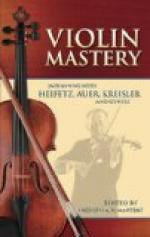“Modern composers have wonderfully improved dynamic expression. Every little shade of meaning they make clear with great distinctness. The older composers, and occasionally a modern like Emanuel Moor, do not use expression marks. Moor says, ’If the performers really have something to put into my work the signs are not needed.’ Yet this has its disadvantages. I once had an entirely unmarked Sonata by Sammartini. As most first movements in the sonatas of that composer are allegros I tried the beginning several times as an allegro, but it sounded radically wrong. Then, at last, it occurred to me to try it as a largo and, behold, it was beautiful!
INTERPRETATION
“If the leader of the quartet has lived himself into and mastered a composition, together with his associates, the result is sure. I must live in the music I play just as an actor must live the character he represents. All higher interpretation depends on solving technical problems in a way which is not narrowly mechanical. And while the ensemble spirit must be preserved, the freedom of the individual should not be too much restrained. Once the style and manner of a modern composer are familiar, it is easier to present his works: when we first played the Reger quartet here some twenty years ago, we found pages which at first we could not at all understand. If one has fathomed Debussy, it is easier to play Milhaud, Roger-Ducasse, Samazeuil—for the music of the modern French school has much in common. One great cultural value the professional quartet has for the musical community is the fact that it gives a large circle a measure of acquaintance with the mode of thought and style of composers whose symphonic and larger works are often an unknown quantity. This applies to Debussy, Reger, the modern Russians, Bloch and others. When we played the Stravinsky pieces here, for instance, his Petrouschka and Firebird had not yet been heard.
SOME IDEALS
“We try, as an organization, to be absolutely catholic in taste. Nor do we neglect the older music, because we play so much of the new. This year we are devoting special attention to the American composers. Formerly the Kneisels took care of them, and now we feel that we should assume this legacy. We have already played Daniel Gregory Mason’s fine Intermezzo, and the other American numbers we have played include David Stanley Smith’s Second Quartet, and movements from quartets by Victor Kolar and Samuel Gardner. We are also going to revive Charles Martin Loeffler’s Rhapsodies for viola, oboe and piano.




